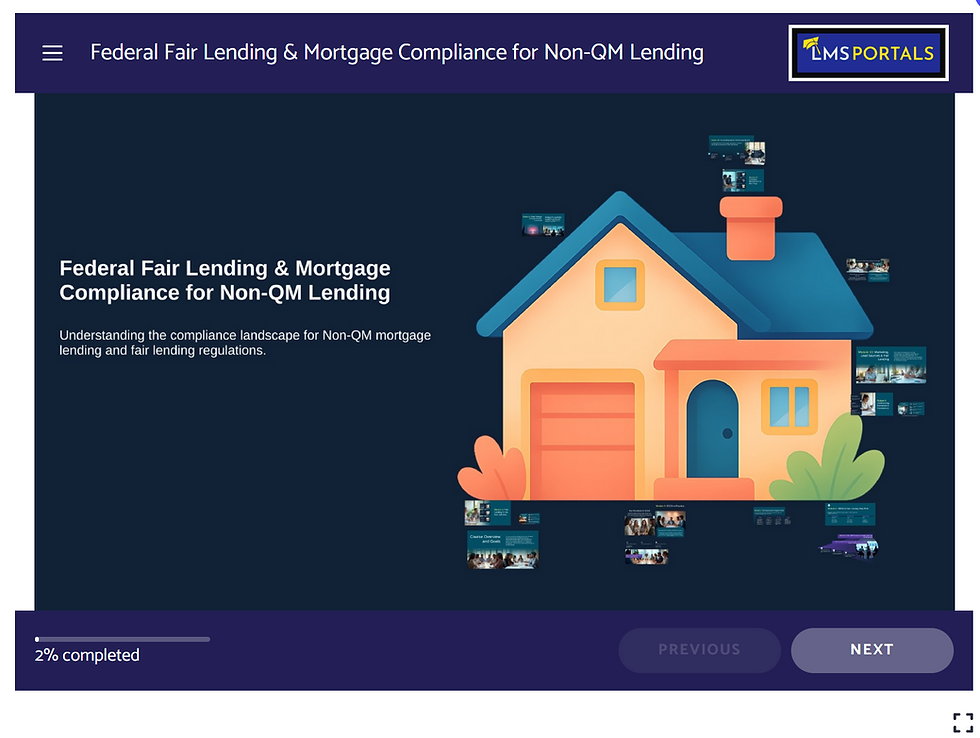Corporate LMS Reporting for Compliance and Regulatory Requirements
- LMSPortals

- Mar 29, 2023
- 3 min read

A Corporate Learning Management System (LMS) offers several benefits for organizations when it comes to meeting compliance and regulatory requirements:
Centralized Management
LMS platforms provide a centralized system for managing compliance training and related activities. This makes it easier to track training completion rates, monitor progress, and ensure that all employees have met the necessary requirements.
Customization
LMS platforms can be customized to meet the specific needs of an organization. This enables organizations to create training content that is tailored to their industry, compliance requirements, and business goals.
Scalability
LMS platforms can be scaled to meet the needs of organizations of all sizes. This means that as an organization grows, the LMS can grow with it, providing the necessary support for compliance training and reporting.
Automated Reporting
LMS platforms can automate the process of generating compliance reports. This saves time and reduces the risk of errors associated with manual reporting.
Flexibility
LMS platforms offer a variety of training delivery options, including online, in-person, and blended learning. This flexibility enables organizations to provide training to employees regardless of their location or work schedule.
Improved Employee Performance
LMS platforms enable organizations to provide employees with the training and resources they need to perform their job functions effectively. This improves employee performance and reduces the risk of compliance violations.
Cost Savings
LMS platforms can help organizations save money on compliance training by reducing the need for in-person training and related travel expenses. Additionally, automated reporting can save time and reduce administrative costs.
Leveraging Corporate LMS Reporting for Compliance and Regulatory Requirements
Compliance and regulatory requirements are an important consideration for organizations, particularly those operating in industries such as healthcare, finance, and information technology. Failure to comply with these requirements can result in fines, legal action, and damage to the organization's reputation.
By leveraging the reporting capabilities of their LMS, organizations can ensure that they are meeting compliance and regulatory requirements. Here are some ways in which LMS reporting can be used for compliance:
Tracking completion rates: LMS reporting can be used to track employee completion rates for mandatory compliance training. This ensures that all employees have completed the required training within the mandated time frame.
Monitoring training progress: LMS reporting can be used to monitor employee progress throughout the training program. This enables organizations to identify employees who may be struggling and provide additional support or training as needed.
Recording assessments and certifications: LMS reporting can be used to record employee assessments and certifications. This ensures that employees have met the necessary requirements and are qualified to perform their job functions.
Audit trails: LMS reporting can provide an audit trail of employee training and compliance activities. This enables organizations to demonstrate compliance with regulatory requirements and respond to audits and inquiries from regulatory bodies.
Performance metrics: LMS reporting can be used to track performance metrics such as completion rates, test scores, and user engagement. This information can be used to identify areas where additional training or support may be needed.
In summary, leveraging corporate LMS reporting for compliance and regulatory requirements is an effective way for organizations to ensure that they are meeting their obligations. By tracking completion rates, monitoring training progress, recording assessments and certifications, providing audit trails, and tracking performance metrics, organizations can demonstrate compliance with regulatory requirements and ensure that their employees are properly trained and qualified.
About LMS Portals
At LMS Portals, we provide our clients and partners with a SaaS-based, multi-tenant learning management system that allows you to launch a dedicated training environment (a portal) for each of your unique audiences.
The system includes an embedded SCORM-compliant course authoring tool that enables most anyone to build engaging courses quickly and easily.
We also offer a complete library of ready-made, white label courses, covering most every aspect of corporate training and employee development.
If you choose to, you can create Learning Paths to deliver courses in a logical progression and add structure to your training program. The system also supports Virtual Instructor-Led Training (VILT) and provides tools for online coaching and social learning.
Together, these features make the LMS Portals platform the ideal platform for compliance and regulatory requirements training with powerful reporting.
Contact us today to get started or visit our Partner Program pages



Comments